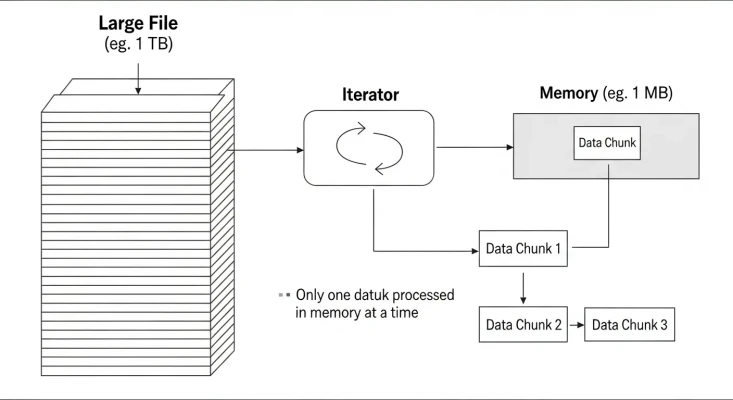PHP's evolution has brought us powerful features for optimizing memory usage, and among the most significant are iterators and generators. These constructs are fundamental to writing high-performance, memory-efficient PHP code, especially when working with large datasets. While they might seem complex at first, understanding and utilizing them can dramatically improve your application's performance and scalability.
The Problem with Large Datasets
Imagine you need to process a massive CSV file, a large database result set, or a stream of data from an API. The traditional approach of loading the entire dataset into an array can quickly lead to memory exhaustion, especially with millions of records. For instance, loading a million records into an array could consume over a gigabyte of RAM. This is where iterators and generators shine, offering a more intelligent way to handle data.
Understanding PHP Iterators
An iterator is an object that allows you to traverse a collection of items one by one, without needing to load the entire collection into memory. This "lazy loading" approach conserves memory and boosts performance. PHP provides a built-in Iterator interface that your classes can implement. This interface requires you to define five methods:
current(): Returns the current element.key(): Returns the key of the current element.next(): Moves to the next element.rewind(): Resets the iterator to the first element.valid(): Checks if the current position is valid.
While powerful, implementing the Iterator interface can sometimes feel verbose, requiring you to manage the iteration state manually.

The Magic of PHP Generators
Introduced in PHP 5.5, generators offer a simpler and more elegant way to create iterators. A generator function looks like a regular function, but instead of using return to return a value, it uses the yield keyword. Any function that contains yield is automatically a generator function.
When you call a generator function, it doesn't execute the entire function at once. Instead, it returns a Generator object that can be iterated over. Each time the yield keyword is encountered, the function's execution is paused, and the yielded value is returned. When the next value is requested, the function resumes from where it left off, preserving its state. This "on-demand" value generation is what makes generators so memory-efficient.
Here's a simple example:
function numberGenerator($start, $end) {
for ($i = $start; $i <= $end; $i++) {
// The value of $i is preserved between yields.
yield $i;
}
}
$numbers = numberGenerator(1, 5);
foreach ($numbers as $number) {
echo $number . ' ';
}
// Output: 1 2 3 4 5
In this example, the numberGenerator function doesn't create an array of numbers in memory. It yields them one at a time as the foreach loop requests them.
Key Differences: Iterators vs. Generators
| Feature | Iterators | Generators |
|---|---|---|
| Complexity | More complex, requires implementing the Iterator interface with five methods. |
Simpler, uses the yield keyword in a function. |
| Boilerplate Code | More boilerplate code. | Less boilerplate code. |
| Readability | Can be less readable due to the implementation overhead. | Generally more readable and concise. |
| Rewindable | Can be rewound and iterated over multiple times. | Forward-only and cannot be rewound. To re-iterate, you must call the generator function again. |
Practical Use Cases for Generators
Generators are incredibly versatile and can be used in various scenarios to optimize your code.
Reading Large Files
One of the most common use cases for generators is processing large files line by line without loading the entire file into memory.
function readLargeFile($filePath) {
$file = fopen($filePath, 'r');
if (!$file) {
return;
}
while (($line = fgets($file)) !== false) {
yield $line;
}
fclose($file);
}
foreach (readLargeFile('large.csv') as $line) {
// Process each line of the CSV file
}
This approach is significantly more memory-efficient than using file_get_contents() or file(), which would load the entire file into memory.
Working with Large Database Result Sets
When fetching a large number of records from a database, generators can prevent your application from running out of memory.
function getDatabaseRecords(\PDO $pdo, string $sql, array $params = []): \Generator {
$stmt = $pdo->prepare($sql);
$stmt->execute($params);
while ($row = $stmt->fetch(\PDO::FETCH_ASSOC)) {
yield $row;
}
$stmt->closeCursor();
}
foreach (getDatabaseRecords($pdo, "SELECT * FROM users") as $user) {
// Process each user record
}
This generator yields one database row at a time, keeping memory usage low even with millions of rows in the result set.
Implementing Infinite Sequences
Generators can also be used to create infinite sequences of data, which would be impossible to store in an array.
function getEvenNumbers() {
$i = 0;
while (true) {
yield $i;
$i += 2;
}
}
$evenNumbers = getEvenNumbers();
// Take the first 10 even numbers
for ($i = 0; $i < 10; $i++) {
echo $evenNumbers->current() . ' ';
$evenNumbers->next();
}
// Output: 0 2 4 6 8 10 12 14 16 18
Advanced Generator Features
PHP generators offer more advanced capabilities beyond simple value yielding.
- Yielding Keys and Values: You can yield a key along with a value, similar to an associative array.
- Delegating Generators with
yield from: Theyield fromkeyword allows a generator to delegate to another generator,Traversableobject, or array. - Sending Values to Generators: You can send values into a generator using the
send()method, which can be useful for more complex, cooperative routines.
When to Use Iterators vs. Generators
- Use Generators when:
- You need a simple and quick way to create a forward-only iterator.
- You are dealing with large datasets and memory efficiency is a primary concern.
- Readability and concise code are important.
- Use the
Iteratorinterface when:- You need a rewindable iterator that can be traversed multiple times.
- You need to implement complex iteration logic that doesn't fit the simple, linear nature of a generator.
- You are building a custom collection class and want to provide a standard way to iterate over it.
Conclusion
PHP iterators and generators are powerful tools for writing memory-efficient and performant code. By understanding how they work and when to use them, you can significantly improve the scalability and reliability of your PHP applications, especially when handling large volumes of data. Embracing these features is a step towards becoming a more proficient and resource-conscious PHP developer.


Add Comment
No comments yet. Be the first to comment!